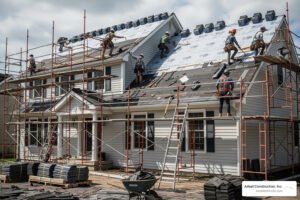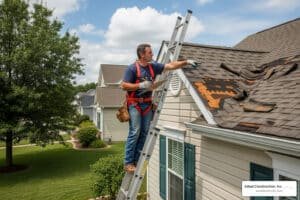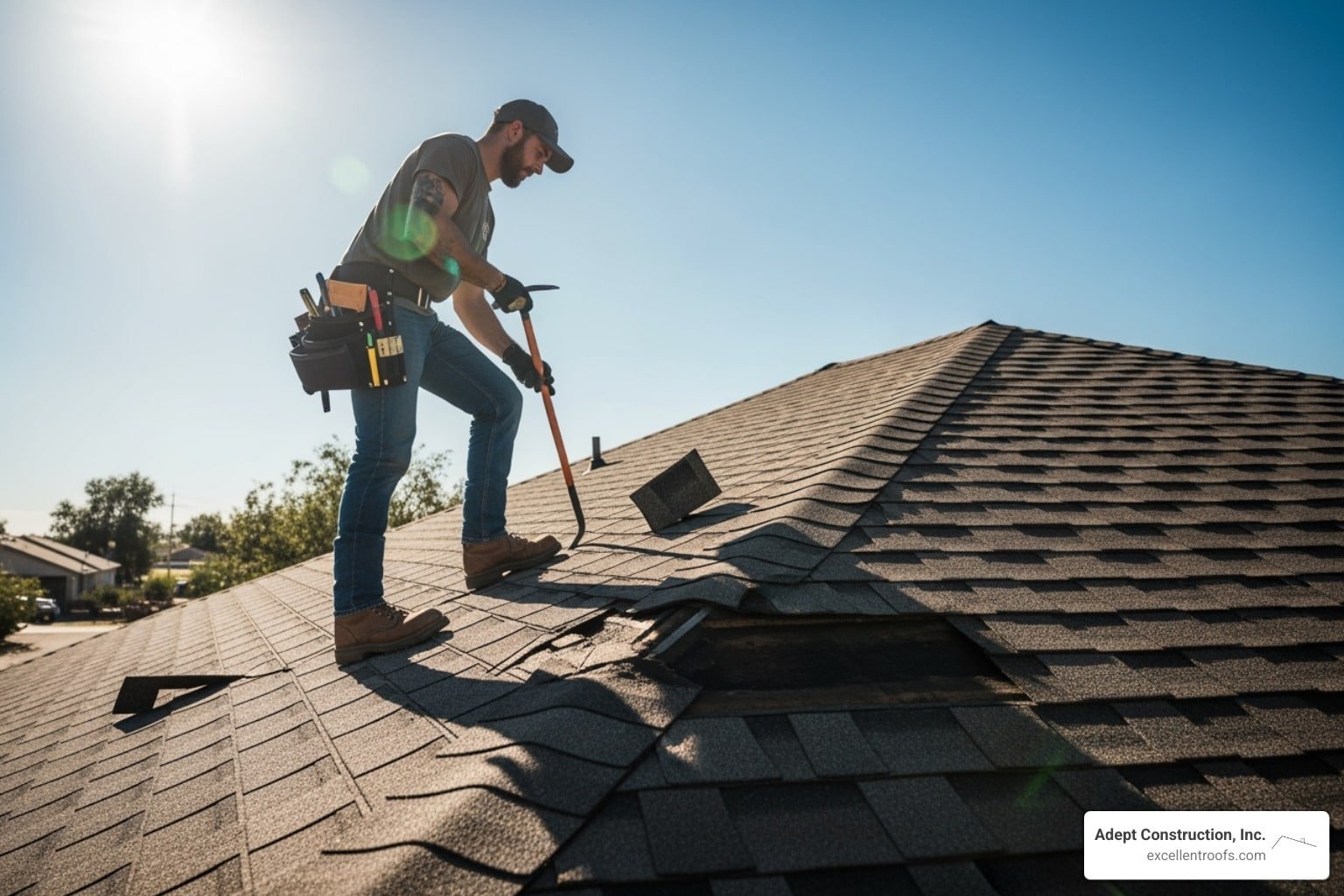
The Great Roofing Debate: Making the Right Choice for Your Home
When your roof needs attention, choosing between a handy man roofer and a professional contractor is a critical decision. It impacts your home’s safety, your wallet, and your peace of mind. As a trusted roofing company in the Chicago suburbs, we’ve seen how the right choice protects your most valuable investment.
Quick Answer for Handyman Roofer Decisions:
- Handyman is suitable for: Minor shingle replacement, gutter cleaning, small leak patches, and cosmetic repairs under $500.
- Professional roofer is required for: Major repairs, structural work, insurance claims, full installations, and any job over $500.
- Key factors to consider: Licensing, insurance, warranties, job complexity, and long-term liability.
Industry research shows that 86% of roof failures result from improper installation, and professional roofers have a 42% lower accident rate than non-specialists. These statistics highlight the high stakes of this choice. Some tasks are perfect for a skilled handyman, while others demand a licensed professional. Making the wrong choice can lead to water damage, voided warranties, and thousands in unexpected costs. Whether you need handyman roofing repair services or a full professional intervention, understanding the difference is key.
As Gerald Michaels, founder of Adept Construction, I’ve spent nearly three decades helping homeowners in the Chicago suburbs avoid costly roofing mistakes. My team ensures you get the right solution, whether it’s a simple handyman repair or comprehensive professional roofing work.
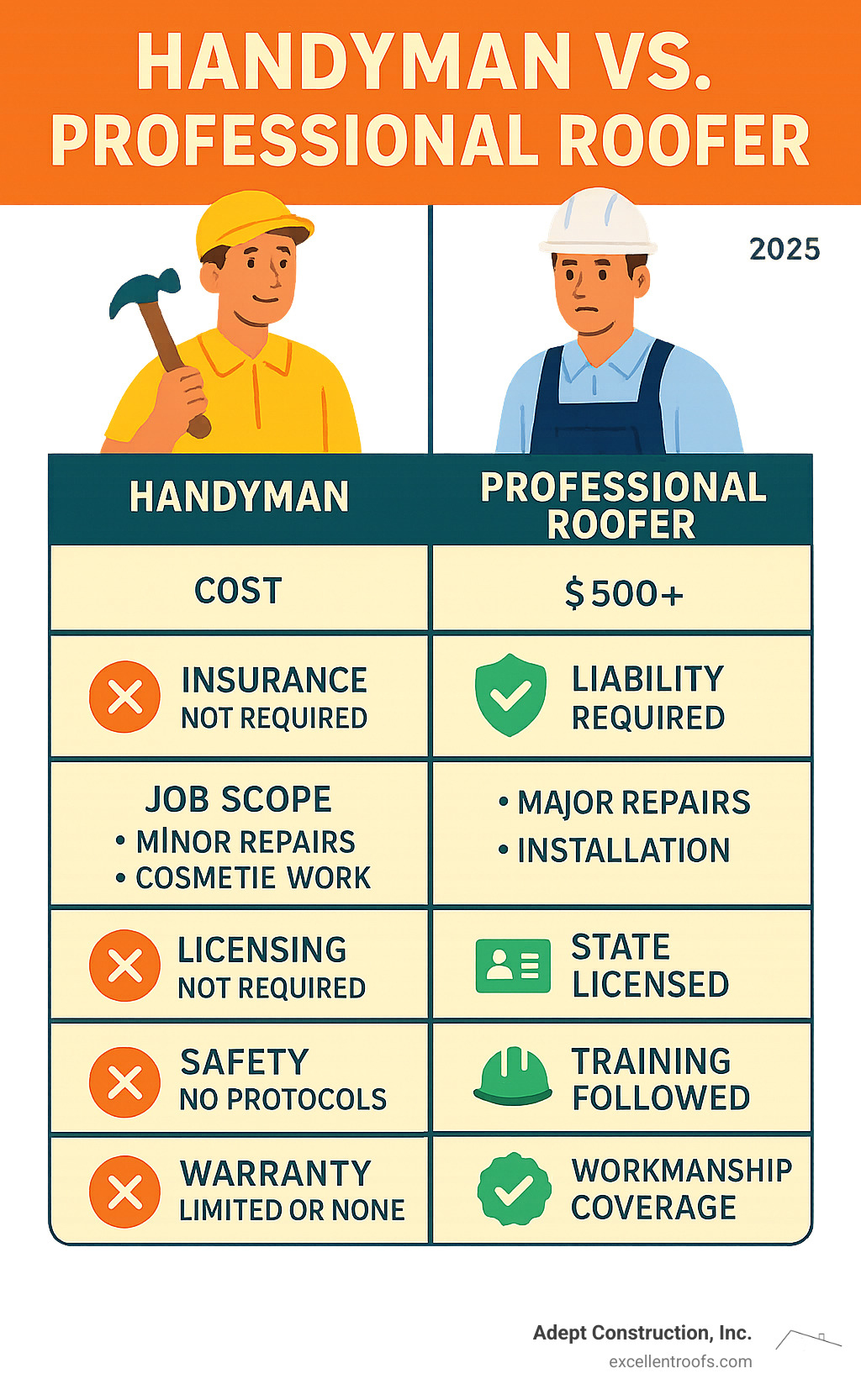
The Handyman’s Toolbox: What Roofing Tasks Can They Handle?
For certain minor issues, a competent handy man roofer can be a cost-effective solution. Think of it this way: you don’t take your car to a specialized engine mechanic for a simple tire rotation. Similarly, for small, non-critical roofing tasks, a handyman might be just what you need.
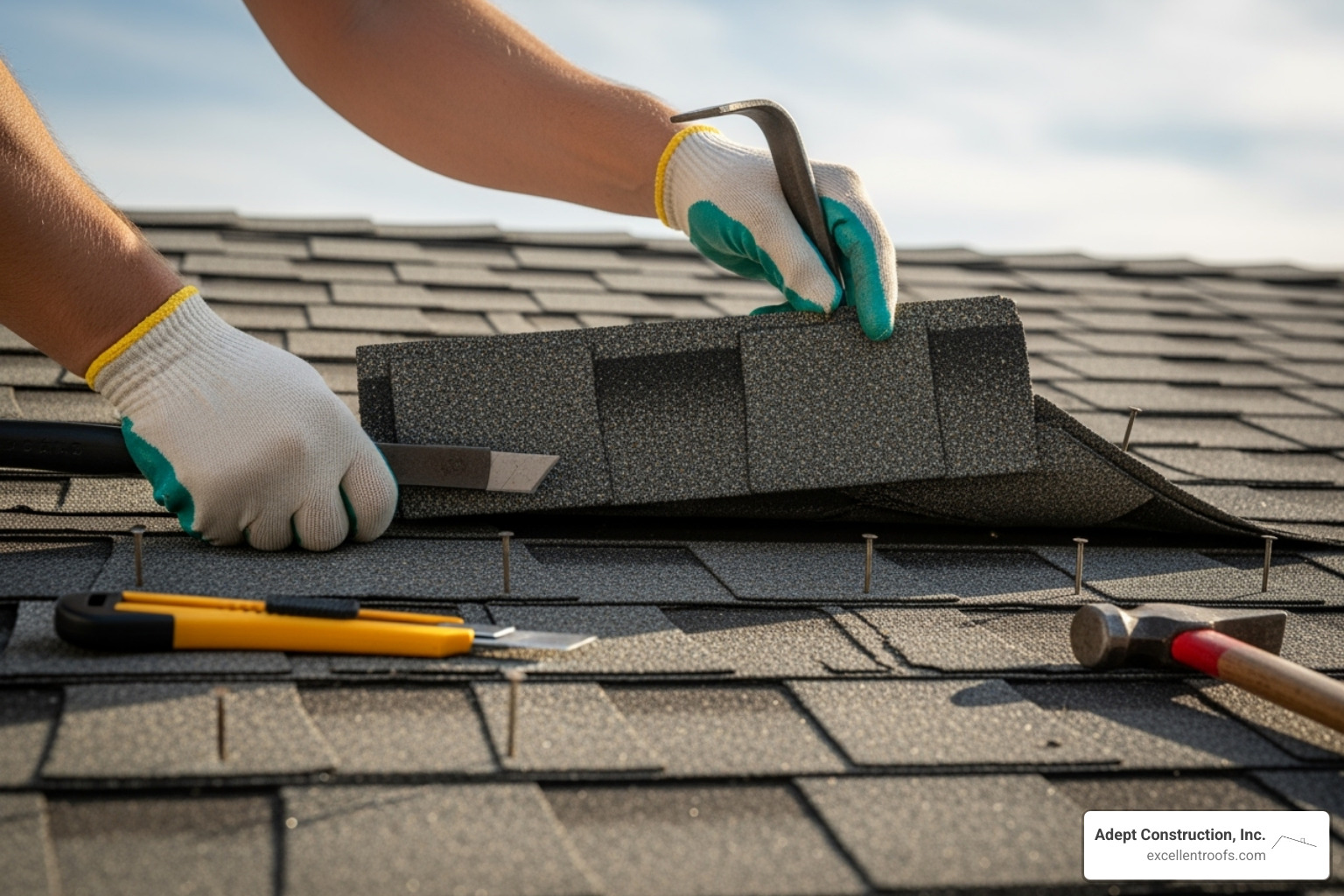
Here’s a rundown of specific roofing tasks a handyman can typically handle:
- Minor Shingle Replacement: Replacing a few shingles that have blown off in a storm is a common handyman task, as long as the underlying roof deck is intact.
- Small Leak Patches: For a very localized and easy-to-access minor leak, a handyman can apply a temporary patch. This is often not a permanent solution.
- Cosmetic Fixes: Tasks like painting roof flashing on non-leaking areas fall within a handyman’s capabilities, as they are about aesthetics rather than structural integrity.
- Adding Soffit Venting: Improving attic ventilation by adding soffit vents is another task a handyman can handle. As noted by This Old House, proper ventilation helps extend the life of your roof.
- Routine Maintenance: A handyman can perform basic roof condition checks for obvious issues like missing shingles, lifted flashing, or exposed fasteners, and handle simple seasonal touch-ups to prevent small problems from escalating.
Handymen can be a cost-effective option for these small jobs, sometimes saving you 20% to 40% compared to a full roofing contractor, with hourly rates as low as $50. However, this cost-effectiveness comes with caveats, which we’ll explore next. Always ensure anyone working on your roof is capable of working safely at heights.
When to Call in the Pros: The Professional Roofer’s Domain
While a handy man roofer can handle minor tweaks, critical situations demand a professional roofing contractor. For anything beyond a simple patch, the stakes are too high to gamble with inexperience.

Major repairs and structural issues require a professional’s trained eye. Problems like a sagging roof, widespread shingle loss, or a damaged underlying deck demand specialized knowledge of structural integrity.
Persistent or mysterious leaks are where professionals shine. They understand how water travels and can trace a leak to its true source, which might be far from where the water appears. Fixing the core issue is vital because 86% of roof failures stem from improper installation.
For full roof replacements or large installations, there is no substitute for professional expertise. Installing a new residential roofing system requires extensive training, specialized equipment, and adherence to building codes.
Storm damage assessment is another professional domain. After severe weather in areas like roof repair in Downers Grove, IL or roof repair in Naperville, IL, we often find hidden hail or wind damage that compromises the entire roof system, even if it looks minor.
Flashing repair and replacement around chimneys and vents is critical. A small mistake here can lead to thousands in water damage, making professional precision essential.
Using an unlicensed handy man roofer for major work can void your material warranties. Furthermore, in Illinois, any roofing job over $500 typically requires a licensed contractor to comply with building codes and permit regulations. Professional roofers steer these rules daily, protecting you from fines and future complications.
The High Stakes of Roofing: Comparing Cost, Quality, and Risk
Choosing between a handy man roofer and a professional involves weighing immediate cost against long-term value and risk.
Let’s break down the critical differences:
| Feature | Handyman | Professional Roofer |
|---|---|---|
| Cost (Hourly) | As little as $50/hour | $78-$85/hour (average, varies by location) |
| Insurance | Often uninsured or minimally insured | Carries workers’ compensation and liability insurance (e.g., $500,000+ coverage) |
| Safety | Higher accident rate, less training (OSHA) | Lower accident rate, 78% more likely to have fall protection training |
| Warranty | Rarely offers workmanship warranty, voids manufacturer warranty | Offers workmanship and material warranties (9 out of 10 companies) |
| Job Scope | Minor repairs, cosmetic fixes, maintenance | Major repairs, full replacements, complex installations, structural work |
| Quality | Varies widely, risk of improper installation | Consistent, high-quality, industry-standard work |
| Legal | May violate local licensing laws for jobs over $500 | Complies with all local and state licensing requirements |
| Insurance Claims | Cannot assist, may complicate claims | Assists with documentation, familiar with process, high success rate |
Cost vs. Long-Term Value
The upfront savings of a handy man roofer are tempting, potentially 20% to 40% on a small job. However, a cheap roof is often the most expensive. Since 86% of roof failures result from improper installation, a faulty repair can lead to repeat visits and extensive water damage, costing thousands more than the initial savings. Professional work, while costing more upfront, leads to a 35% decrease in callback rates. This durability protects your home and saves you money in the long run. When deciding if you need roof repair or replacement, a professional assessment prevents costly missteps.
The Critical Role of Licensing and Insurance for any Handy Man Roofer
This is about your protection. In Illinois, roofing contractors must be licensed by the state (IDFPR), a requirement for most jobs over $500. You can easily verify an Illinois roofer’s license online. Licensed roofers carry two crucial insurance types:
- Workers’ Compensation: If a worker is injured on your property, this insurance covers their medical bills. Without it, you could be personally liable for tens of thousands of dollars.
- Liability Insurance: This covers any damage to your property during the job. An uninsured handyman leaves you to pay for any accidents.
Hiring an unlicensed handy man roofer can also void your roofing material warranties and put you at legal risk. The peace of mind that comes with a licensed, insured professional is priceless.
Safety First: Why a Professional Roofer is Safer than a Handy Man Roofer
Roofing is one of the most dangerous jobs. Professional roofers are 78% more likely to receive appropriate fall protection training and experience a 42% lower accident rate than non-specialists.
- Training and Equipment: Professionals use proper safety gear like harnesses, lifelines, and guardrails. A handyman may lack this specialized equipment and training.
- Hazard Recognition: Professionals are trained to identify risks like unstable roof sections or electrical lines, ensuring the job site is secure.
- Quality Work: Safe work practices lead to better, more precise installation. Knowing the top signs your roof needs immediate repair after a storm and having a trained professional address them safely is paramount.
Navigating Insurance Claims: A Job for Professionals, Not Handymen
After a storm, you’re not just fixing your roof; you’re dealing with your insurance company. This is where the gap between a handy man roofer and a professional contractor becomes a canyon.

Insurance adjusters require specific documentation—detailed reports, correctly angled photos, and industry-standard estimates—that a handyman typically cannot provide. Professional roofers are fluent in this process and act as your advocate.
Professional roofing companies often achieve 95% success rates in getting claims approved. They know how to properly document storm damage and meet with the adjuster on-site to ensure nothing is missed. An adjuster is unlikely to take a handyman’s assessment seriously, which can lead to a denied claim.
After major storms, beware of “storm chasers” who use high-pressure tactics and demand cash. These out-of-town contractors often do shoddy work. A local, professional contractor will never pressure you.
Understanding what you need to know about hail damage repair is crucial for maximizing your claim. A professional ensures your settlement covers all necessary repairs, not just the most obvious ones.
When insurance money is on the table, a handy man roofer can’t provide the expertise you need. A professional contractor turns a stressful situation into a manageable one, protecting your home and your wallet.
Frequently Asked Questions about Hiring for Roof Work
Choosing between a handy man roofer and a professional is a big decision. Here are answers to the most common questions we hear from homeowners.
Can a handyman install a new roof?
Absolutely not. A new roof installation is a complex project that requires deep knowledge of structural engineering, ventilation, waterproofing, and local building codes. A handyman lacks this specialized training. Furthermore, using an unlicensed individual will void material warranties and poses significant safety and legal risks. For major projects like full roof installation, you need the expertise that only comes with a licensed, experienced professional.
How much can I really save with a handyman roofer?
On paper, you might save 20-40% on the initial bill for a minor repair. However, cheap often becomes expensive. A $200 patch that fails in six months can cause thousands of dollars in water damage to your ceiling, walls, and furniture. Licensed roofers’ repairs last significantly longer, and when you factor in the avoided callbacks, prevented water damage, and maintained warranties, professional work almost always costs less in the long run. You get the peace of mind that the job was done right the first time.
What are the biggest red flags when hiring someone for roof repair?
After decades in the business, we’ve seen the warning signs that homeowners should watch for. Be cautious if a contractor:
- Cannot provide a license or proof of insurance. In Illinois, a roofer’s license starts with 104 or 105. You can verify it on the IDFPR website.
- Demands large upfront payments or cash only. A reputable roofer typically asks for 10-20% down, not 50% or more in cash.
- Uses high-pressure sales tactics. Real professionals give you time to consider your options and don’t rely on scare tactics, especially after a storm.
- Doesn’t provide a detailed written contract. The scope of work, materials, timeline, and warranty information should all be in writing.
- Lacks a local presence. A P.O. box, no local reviews, or an inability to provide recent references are all red flags for fly-by-night operators.
Trust your instincts. If something feels off, it probably is. It’s always better to be cautious when protecting your home.
Conclusion: Making the Smart Choice for Your Home’s Protection
When protecting your most valuable investment, the choice between a handy man roofer and a professional is about long-term safety and value, not just initial cost.
A skilled handyman is suitable for minor tasks like replacing a few shingles or small patches. But for major repairs, structural issues, insurance claims, or full installations, only a licensed professional has the expertise, insurance, and safety protocols to do the job right.
The statistics are clear: 86% of roof failures stem from improper installation, and professionals have a 42% lower accident rate. These numbers represent real-world protection for your home and family. A licensed contractor provides warranty protection and insurance claim assistance, saving you from significant headaches.
For homeowners in the Chicago suburbs, choosing the right contractor means choosing peace of mind. Whether you need comprehensive roofing help or post-storm guidance, a licensed professional ensures your roof will protect your home for years to come.
At Adept Construction, Inc., we have served families with superior customer service and high-quality workmanship for decades in roofing services in Downers Grove and roofing services in Naperville.
Don’t let a roofing decision keep you up at night. We offer free, no-obligation estimates—contact us today for your free estimate and find why so many of your neighbors trust us to protect what matters most.



